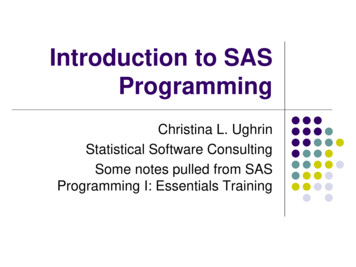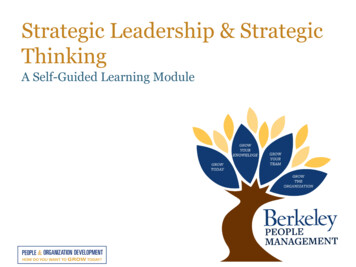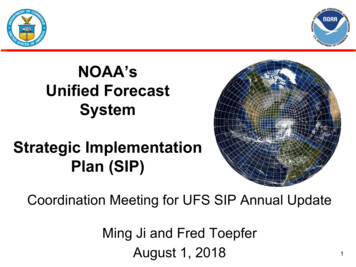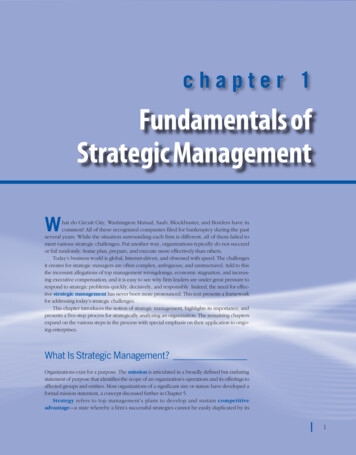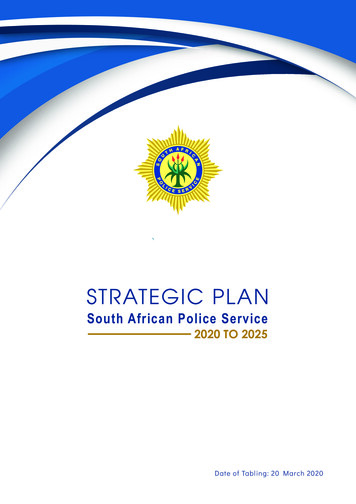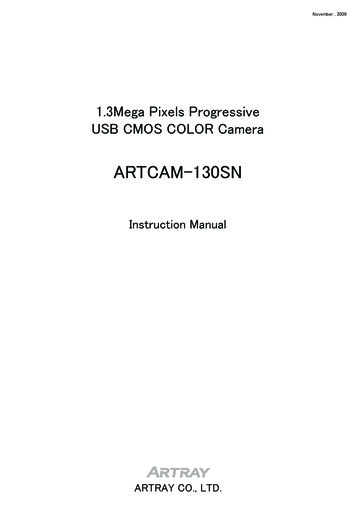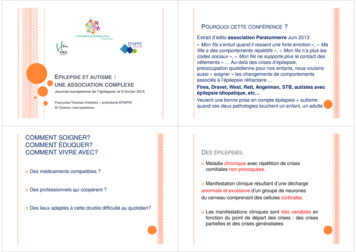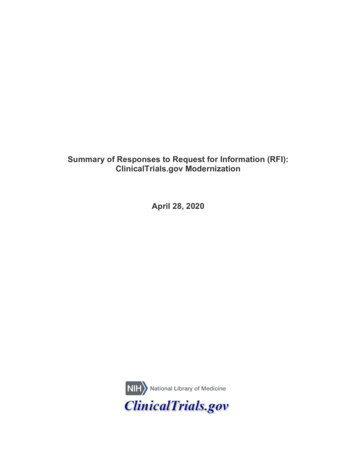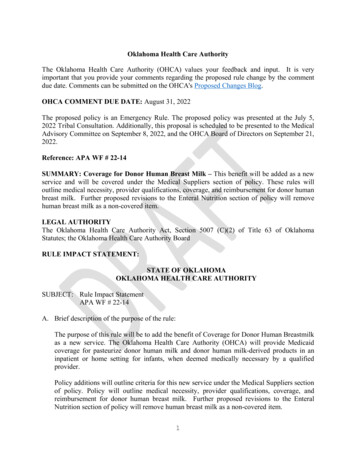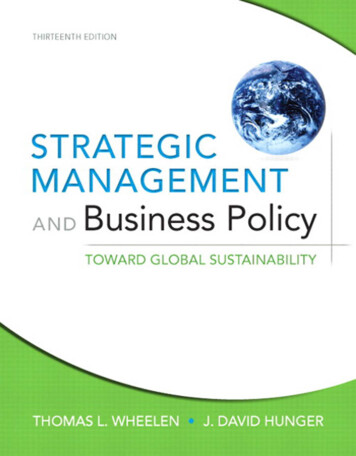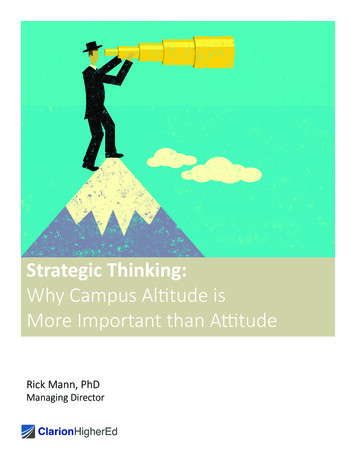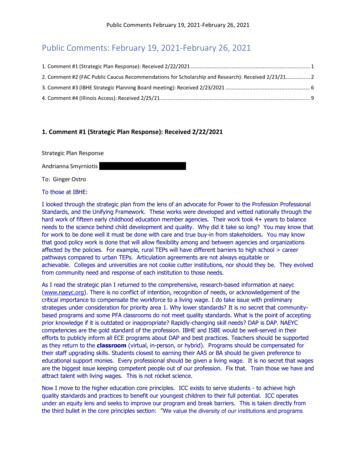
Transcription
Public Comments February 19, 2021-February 26, 2021Public Comments: February 19, 2021-February 26, 20211. Comment #1 (Strategic Plan Response): Received 2/22/2021 . 12. Comment #2 (FAC Public Caucus Recommendations for Scholarship and Research): Received 2/23/21. 23. Comment #3 (IBHE Strategic Planning Board meeting): Received 2/23/2021 . 64. Comment #4 (Illinois Access): Received 2/25/21 . 91. Comment #1 (Strategic Plan Response): Received 2/22/2021Strategic Plan ResponseAndrianna Smyrniotis Andrianna.Smyrniotis@icc.edu To: Ginger OstroTo those at IBHE:I looked through the strategic plan from the lens of an advocate for Power to the Profession ProfessionalStandards, and the Unifying Framework. These works were developed and vetted nationally through thehard work of fifteen early childhood education member agencies. Their work took 4 years to balanceneeds to the science behind child development and quality. Why did it take so long? You may know thatfor work to be done well it must be done with care and true buy-in from stakeholders. You may knowthat good policy work is done that will allow flexibility among and between agencies and organizationsaffected by the policies. For example, rural TEPs will have different barriers to high school careerpathways compared to urban TEPs. Articulation agreements are not always equitable orachievable. Colleges and universities are not cookie cutter institutions, nor should they be. They evolvedfrom community need and response of each institution to those needs.As I read the strategic plan I returned to the comprehensive, research-based information at naeyc(www.naeyc.org). There is no conflict of intention, recognition of needs, or acknowledgement of thecritical importance to compensate the workforce to a living wage. I do take issue with preliminarystrategies under consideration for priority area 1. Why lower standards? It is no secret that communitybased programs and some PFA classrooms do not meet quality standards. What is the point of acceptingprior knowledge if it is outdated or inappropriate? Rapidly-changing skill needs? DAP is DAP. NAEYCcompetencies are the gold standard of the profession. IBHE and ISBE would be well-served in theirefforts to publicly inform all ECE programs about DAP and best practices. Teachers should be supportedas they return to the classroom (virtual, in-person, or hybrid). Programs should be compensated fortheir staff upgrading skills. Students closest to earning their AAS or BA should be given preference toeducational support monies. Every professional should be given a living wage. It is no secret that wagesare the biggest issue keeping competent people out of our profession. Fix that. Train those we have andattract talent with living wages. This is not rocket science.Now I move to the higher education core principles. ICC exists to serve students - to achieve highquality standards and practices to benefit our youngest children to their full potential. ICC operatesunder an equity lens and seeks to improve our program and break barriers. This is taken directly fromthe third bullet in the core principles section: "We value the diversity of our institutions and programs
Public Comments February 19, 2021-February 26, 2021including public and private, research and regional, four-year and two-year institutions, and credential andcertificate programs." ICC is not included in statewide conversations or initiatives. ICC works directlywith students to get them their credentials. We offer certificates and degrees in ECE. I consider ICC adiverse institution because we do not fit into the majority culture of other 2-year institutions in Illinois. Andyet, I am/ICC is precluded. In this instance, you do not value the diversity of my 2-year institution,working to align to NAEYC. To be equitable, include me. If not, rewrite this principle to be accurate.I don't want to think that ISBE is working against the largest professional membership organization in thenation and its P2P initiative. I am dedicated to maintaining a connection with our community ECprograms. I am dedicated to modifying our courses to increase our attraction to working students. I amdedicated to our connections with high school students and inviting them into the profession. I amcommitted to earn NAEYC accreditation, which will, I am informed, align with state credentials toaccommodate students who may want them. There is a national standard. Illinois should not be anisland. That creates a barrier to our workforce. If they move out of state as many are, they will findthey are not qualified for the profession they love.Respectfully submitted,Andrianna Smyrniotis, ProfessorProgram Coordinator, AdvisorEarly Childhood Education227D Academic Bldg (E.Peoria)309 694 5172“There is no such thing as online preschool,” NAEYC CEO Rhian Evans Allvin wrote inan online statement. “Technology-based apps are not preschool, and they are nothigh-quality child care.”I will reply to emails within 24 business-day hours, Monday through Friday. Thank you!!2. Comment #2 (FAC Public Caucus Recommendations for Scholarship and Research):Received 2/23/21FAC Public Caucus Recommmendations for Scholarship and ResearchCarr, Amy ar-carr@wiu.eduTo: Ginger Ostro
Public Comments February 19, 2021-February 26, 2021Cc: Schumacher, Shawn sschumacher@devry.eduGinger,Please see attached--a slightly longer version of what Shawn shared today. He'll share his versionseparately with the board as well.Thanks,Amy-Dr. Amy CarrProfessor of Religious Studies, Department of Liberal Arts & SciencesCoordinator, Master of Liberal Arts & Sciences (MLAS) ProgramWestern Illinois UniversityMorgan 203-AIBHE Faculty Advisory Council Public University CaucusRecommendations for Supporting Scholarship and Research in theStrategic Plan for Higher Ed in IllinoisIn its meeting on February 19, 2021, the IBHE FAC Public University Caucus responded to a request tocome up with specific recommendations regarding support for scholarship and research in the strategicplan.The draft of the strategic plan states that strategies to address the priority areas (access, affordability,and credential/degree attainment) should align with six core principles. One of those principles is“Higher education is a public good that enriches life”:Higher education is a public good that enriches life. We depend on higher education to preserve,expand, and transmit knowledge, offer solutions to society’s challenges, serve as a civic partner,and enrich life. Research at our institutions expands understanding and drives innovation andeconomic development. Learning is enhanced when students participate in research and handson experiences. Liberal arts and humanities ensure we support the whole student and betterunderstand the human condition. Institutions are vibrant anchors of communities.The emphasis on expanding early college in current drafts of the plan does not align with support forscholarship and research, for reasons we have described in earlier feedback. In particular, theexponential growth of Gen Ed courses taught by high school teachers reduces the student credit hourproduction of college and university faculty members in the liberal arts and sciences. The range ofcourse offerings for dual credit courses also is limited to what can count for high school credit, especiallywhen the range of offerings is further limited to what high school teachers can offer. This means a wider
Public Comments February 19, 2021-February 26, 2021range of fields may be off-limits to Gen Ed exploration by high school students—fields like AfricanAmerican studies, anthropology, art history, geology, philosophy, religious studies, and women’sstudies, among others. Many of these smaller liberal arts fields depend on Gen Ed courses, so there isfurther pressure to close programs in these areas, despite the increasing recognition (as stated in thecore principle above) that the liberal arts and humanities are foundational to the meaning of highereducation. Closing these programs means removing spaces for scholarship and research in these fieldsat colleges and universities. Moreover, students who enter a four year university with their GeneralEducation courses completed during high school will have less exposure to possible major and minors—possibilities traditionally explored through Gen Ed courses on a college or university campus.We have described these concerns in our previous caucus recommendations, as well as in the FAC DualCredit position paper and FAC Dual Credit Working Group responses to the strategic plan.Here are some of our specific recommendations:1. Add a design group whose specific aim is to assess the alignment of every strategic priority strategywith the core principle “Higher education is a public good,” with particular attention to each strategy’spotential or likely effects on scholarship and research. This design group could also recommendalternatives that enhance rather than diminish the state’s commitment to scholarship and research.2. Limit early college that can fulfill the General Education Core Curriculum (GECC) to no more than twocourses, with no more than one course from any of the four areas (Communication, Humanities and FineArts, Mathematics, Physical Sciences and Life Sciences, Social and Behavioral Sciences). This providesexposure to college-level work (ideally in a college rather than high school setting), but limits how muchcollege happens in high school itself.3. Rather than diverting state resources to early college opportunities, invest in the institutions thatsupport scholarship and research: adequately fund public universities and community colleges so thattuition costs can be driven down. This reduces parental pressure for “cheap” college through dual creditcourses, and gives students the traditionally wider set of options for their college course work anddegree paths.4. Create public-private partnerships that connect research findings to the needs of industries, business,and local to global communities. At the same time, ensure that the academic freedom of researchers isrespected, since universities have been the space in which knowledge is expanded and discoveries madewithout a purely applied end in mind.5. Invest in opportunities for part-time independent scholarship and research by those without collegeor university teaching positions who are employed outside of academia. Create a task force todetermine how university libraries can make their resources available to independent scholars in thehumanities and social sciences, wherever they live or work in the state (currently only those employedby universities have full access to library resources). Explore avenues for scholars with terminal degreeswho, lacking teaching positions, still seek to pursue part-time research in the sciences and in appliedfields, and need connections to university resources.6. If our above recommendations are not pursued, we suggest streamlining secondary to post-secondaryhigher education not only in the direction of credentialing, but in the direction of scholarship andresearch: expect high school teachers offering dual credit courses to contribute to scholarship and
Public Comments February 19, 2021-February 26, 2021research in the fields they teach. Provide time and resources for high school teachers and communitycollege faculty to pursue scholarship and research, and assist them in completing doctorates and otherterminal degrees in their fields.Our caucus identified additional harms that accompany expanded early college: Students who anticipate attending a 4-year institution, but who enter college with most or allof their Gen Ed requirements completed, will have a shorter time at a 4 year school, and somuch less opportunity to be mentored by professors and drawn into undergraduateresearch. Research teams at universities often include undergraduate and graduate studentsalong with faculty members. Faculty-undergraduate research programs are key torecruiting top-notch students to our institutions. These research programs attract someof the best students and help to keep them in the state of Illinois. Expanding early college in the name of equity fosters new forms of inequity. By limitinghow many early college courses can transfer, highly selective private colleges and universitiesacross the country that do not opt into the Illinois Articulation Initiative (which forces theacceptance of all early college courses) can now market themselves in the way that many ofIllinois’ public universities increasingly cannot do: by promising to offer a full 4-yearresidential undergraduate education, with the opportunity to build meaningful social capitalover time with faculty and fellow students, by taking courses taught by faculty memberswith terminal degrees in their fields who are actively engaged in scholarship and research. One might argue that early college still allows a commitment to the liberal arts and sciences,including the humanities and social sciences, because early college still involves taking GenEd courses. But for every dual credit Gen Ed course taken, a student’s educationalengagement with the humanities, social sciences, or sciences is cut in half (since one coursecounts as two).Members of the public caucus emphasized that scholarship and research are a public good, includingscholarship in all the fields that help us “better understand the human condition.” One scientist said hermotto is, “At most schools the STEM makes the living, but the arts and humanities make life worthliving.” A mathematician pointed out that most patents are initiated by work done in universities, andadded that humanities research is a national security issue. Another faculty member observed that inKorea, Samsung is training employees in the humanities, including philosophy and logic, because theyfoster the ability to see problems from new angles and to imagine alternatives; this increasesinnovation, even in technology. Several noted that many employers don’t want employees who come inwith a specific skill set so much as with soft skills and with the ability to think independently andcritically, “outside the box.” This ability to adapt is also crucial when most people are changing jobs andcareers over the course of their lives.Our caucus perceives that scholarship and research is taken for granted in the strategic plan, assomething that exists in the background rather than foreground of educational policy strategizing. Butthe unintentional consequence of early college and alternative credentialing is a disinvestment inscholarship and research, and in the fields that are supported by these endeavors—including fields
Public Comments February 19, 2021-February 26, 2021important for all the reasons stated in the core principle, “Higher education is a public good thatenriches life.”3. Comment #3 (IBHE Strategic Planning Board meeting): Received 2/23/2021IBHE Strategic Planning Board meeting.From: Schumacher, Shawn sschumacher@devry.edu Sent: Thursday, February 25, 2021 2:13 PMTo: Lohman, Gretchen Lohman@ibhe.org ; Rembusch, Tracy Rembusch@ibhe.org Cc: Bernoteit, Stephanie Bernoteit@ibhe.org Subject: [External] Advisory Committee Report notesThe notes from the February 23, 2021 meeting are attached.Best always,ShawnShawn Schumacher, Ph.D. Senior Professor English and HumanitiesFaculty Advisory Council to the Illinois Board of Higher Education ChairP 630.652.8252 M 630.362.0918 E sschumacher@devry.edu1221 N. Swift Road Addison, IL 60101 devry.eduActing Board Chair Kothari, esteemed members of the Board, fellow colleagues, and friends:
Public Comments February 19, 2021-February 26, 2021The Faculty Advisory Council to the Illinois Board of Higher Education has been invited to convey specificrecommendations regarding support for scholarship and research in the IBHE strategic plan.The draft of the strategic plan states that strategies to address the priority areas—access, affordability,and credential/degree attainment—should align with six core principles. The fifth core principle, aswritten in the current iteration of the strategic plan, is “Higher education is a public good that enricheslife”:The emphasis on expanding early college in current drafts of the plan does not align with support forscholarship and research, for reasons we have described in earlier feedback. In particular, theexponential growth of Gen Ed courses taught by high school teachers reduces the student credit hourproduction of college and university faculty members in the liberal arts and sciences. The range ofcourse offerings for dual credit courses also is limited to what can count for high school credit, especiallywhen the range of offerings is further limited to what high school teachers can offer. This means a widerrange of fields may be off-limits to Gen Ed exploration by high school students—fields like AfricanAmerican studies, anthropology, art history, geology, philosophy, religious studies, and women’sstudies, among others. Many of these smaller liberal arts fields depend on Gen Ed courses, so there isfurther pressure to close programs in these areas, despite the increasing recognition that the liberal artsand humanities are foundational to the meaning of higher education. Closing these programs meansremoving spaces for scholarship and research in these fields at colleges and universities. Moreover,students who enter a four year university with their General Education courses completed during highschool will have less exposure to possible major and minors—possibilities traditionally explored throughGen Ed courses on a college or university campus.These concerns have been addressed in our previous FAC recommendations, as well as in the FAC DualCredit position paper and FAC Dual Credit Working Group responses to the strategic plan, which havebeen provided to the IBHE staff.Now, I’d like to relay the Faculty Advisory Council’s six specific recommendations:Recommendation 1:Add a design group whose specific aim is to assess the alignment of every strategic priority strategy withthe core principle “Higher education is a public good,” with particular attention to each strategy’spotential or likely effects on scholarship and research. This design group could also recommendalternatives that enhance, rather than diminish, the state’s commitment to scholarship and research.Recommendation 2:Limit early college that can fulfill the General Education Core Curriculum (GECC) to no more than twocourses, with no more than one course from any of the four areas (Communication, Humanities and FineArts, Mathematics, Physical Sciences and Life Sciences, Social and Behavioral Sciences). This providesexposure to college-level work—ideally in a college rather than high school setting—but limits howmuch college happens in high school itself.Recommendation 3:Rather than diverting state resources to early college opportunities, invest in the institutions thatsupport scholarship and research. Adequately fund public universities and community colleges so that
Public Comments February 19, 2021-February 26, 2021tuition costs can be driven down. This reduces parental pressure for “cheap” college through dual creditcourses, and gives students the traditionally wider set of options for their college course work anddegree paths.Recommendation 4:Create public-private partnerships that connect research findings to the needs of industries, business,and local to global communities. At the same time, ensure that the academic freedom of researchers isrespected, since universities have been the space in which knowledge is expanded and discoveries madewithout a purely applied end in mind.Recommendation 5:Invest in opportunities for part-time independent scholarship and research by those without college oruniversity teaching positions who are employed outside of academia. Create a task force to determinehow university libraries can make their resources available to independent scholars in the humanitiesand social sciences, wherever they live or work in the state. Explore avenues for scholars with terminaldegrees who, lacking teaching positions, still seek to pursue part-time research in the sciences and inapplied fields, and need connections to university resources.Recommendation 6:If our above recommendations are not pursued, we suggest streamlining secondary to post-secondaryhigher education not only in the direction of credentialing, but in the direction of scholarship andresearch. We should expect high school teachers offering dual credit courses to contribute toscholarship and research in the fields they teach. We also should provide time and resources for highschool teachers and community college faculty to pursue scholarship and research, and assist them incompleting doctorates and other terminal degrees in their fields.Furthermore, through Council discussions, additional harms that accompany expanded early collegehave also been identified:First, students who anticipate attending a 4-year institution, but who enter college with most or all oftheir Gen Ed requirements completed, will have a shorter time at a 4 year school, and so much lessopportunity to be mentored by professors and drawn into undergraduate research. Research teams atuniversities often include undergraduate and graduate students along with faculty members. Facultyundergraduate research programs are key to recruiting top-notch students to our institutions. Theseresearch programs attract some of the best students and help to keep them in the state of Illinois.In addition, expanding early college in the name of equity fosters new forms of inequity. By limiting howmany early college courses can transfer, highly selective private colleges and universities across thecountry that do not opt into the Illinois Articulation Initiative can now market themselves in the waythat many of Illinois’ public universities increasingly cannot do: by promising to offer a full 4-yearresidential undergraduate education, with the opportunity to build meaningful social capital over timewith faculty and fellow students, by taking courses taught by faculty members with terminal degrees intheir fields who are actively engaged in scholarship and research.
Public Comments February 19, 2021-February 26, 2021Finally, one might argue that early college still allows a commitment to the liberal arts and sciences,including the humanities and social sciences, because early college still involves taking Gen Ed courses.But for every dual credit Gen Ed course taken, a student’s educational engagement with the humanities,social sciences, or sciences is cut in half, since one course counts as two.Through continued discussions, Council members emphasized that scholarship and research are a publicgood, including scholarship in all the fields that help us “better understand the human condition.” OneCouncil member, a scientist, said her motto is, “At most schools the STEM makes the living, but the artsand humanities make life worth living.” Another Council member, a mathematician, pointed out thatmost patents are initiated by work done in universities, and added that humanities research is a nationalsecurity issue. Another faculty member observed that in Korea, Samsung is training employees in thehumanities, including philosophy and logic, because they foster the ability to see problems from newangles and to imagine alternatives; this increases innovation, even in technology. Several Councilmembers noted that many employers don’t want employees who come in with a specific skill set somuch as with soft skills and with the ability to think independently and critically, “outside the box.” Thisability to adapt is also crucial, when most people are changing jobs and careers over the course of theirlives.The Faculty Advisory Council to the Illinois Board of Higher Education perceives that scholarship andresearch is taken for granted in the strategic plan—as something that exists in the background ratherthan foreground of educational policy strategizing. But the unintentional consequence of early collegeand alternative credentialing is a disinvestment in scholarship and research and the fields that aresupported by these endeavors—including fields important for all the reasons stated in the coreprinciple, “Higher education is a public good that enriches life.”Faithfully submitted,Shawn Schumacher, Ph.D.Faculty Advisory Council ChairFebruary 23, 20214. Comment #4 (Illinois Access): Received 2/25/21illinois access illinois.access.ece@gmail.comTo: Ginger OstroTo: IBHE Strategic Plan Advisory2/25/2021
Public Comments February 19, 2021-February 26, 2021We, a group of committed and experienced community college Early Childhood faculty, gratefullyaccept the request to provide feedback on the IBHE Draft Strategy Document 2/2/21. We areprofessionals who work across the state of Illinois within Certificate, AAS and AA programs preparingand supporting the early childhood workforce in private and public settings. IBHE and ICCB arevalued and engaged partners in educator preparation, and therefore we would like to express oursupport, with limited concerns, for the Strategic Plan contents.Beginning with the “Working Higher Education Core Principles” on page 6, we wholeheartedly agreewith the first principle: “Students are our priority”. Student’s short-term objectives and long-termsuccess should always be first in mind to guide IBHE decisions. Institutions of higher education mustalways begin where each student is at presently, and then provide the instruction, financial resourcesand companion supports to help them overcome barriers and reach their life’s potential.Considering the second principle: “Equity drives our system”, we strongly agree that IBHE mustalways view each decision to ensure it will build access and affordability for all students. As EarlyChildhood faculty, we lead programs where the majority of our students are female, first generation,and low- income students. Depending on our institution, our Early Childhood programs will havehigh representation of students of color, adult learners, and rural students. IBHE should continue toengage with diverse students and connect with faculty from community colleges to explore anddetermine what services and supports are desirable, utilized and impactful.We applaud IBHE for including “We reinforce the P-20 education continuum.” as another HigherEducation Core Principle. Like IBHE, as faculty we thoughtfully acknowledge our role in facilitating thepreparation of future early childhood birth – 3rd grade teachers. Taking a cohesive and collaborativeapproach with professionals across all education settings, IBHE should continue this important longterm strategy.In addition to our congruence with the three Core Principles stated previously, there is much in theStrategic Plan draft that we support. However, there are a few statements which give us pause. Wealso would like additional specific emphasis added to the Educator Workforce section that wouldexplicitly engage new, interested candidates to begin a pathway toward teaching.Concern #1 on page 1 under Priority Area 1.o Build on current educational delivery innovations and broaden to new ways and flexible ways todeliver and document education (e.g., shorter-term, stackable learning modules to help studentsdevelop new skills; competency-based models that provide options for students to complete apersonalized path to degree; portable ways for students to document their credentials, like a“passport”).We agree we must continue to innovate with multiple modalities and up to date instructional delivery.It is essential to allow institutions flexibility to design courses and programs to meet learner needs inline with accrediting bodies. However, we are hesitant to agree to such specific action steps withoutunderstanding how faculty will be engaged in the execution. The examples given blur training, moduleportable learning and credentials with college coursework and degree attainment. We respectfullysuggest more study and research is needed to understand the rate of retention, future understanding,and delayed skill production after completion of "short term, stackable learning modules" in lieu of
Public Comments February 19, 2021-February 26, 2021college courses and certificates. It is a disservice to students of all backgrounds if an emphasis oncompletion rates and segmented learning leads to uneven, inferior career preparation, as well asadditional barriers to credential or degree attainment and transferability. Further, it is a disservice tothe children and families for whom they serve, which can lead to further inequity for children.Furthermore, in the same priority area the phrase “personalized path to degree” is mentioned. This“personalized path” is also stated later in the strategic plan. As faculty, we work with diverse studentpopulations with varying personal and community needs and help them reach their individual careerobjectives. However, we have strong reservations about this “personalized path” encompassing thisIBHE Strategic Plan due to the significant level of financial resources that would have to be committed.Competency based education systems, where each student would have their individual baselinecompetencies toward a subject measured and mapped would require an entire overhaul of the IllinoisHigher Education System. That investment of time and financial resources could be invested in moreimmediate and impactful strategies in student supports, advising, tutoring, cohorts, apprenticeships,scholarships, etc. Illinois has a finite amount of capital to invest in higher educa
These works were developed and vetted nationally through the hard work of fifteen early childhood education member agencies. Their work took 4 years to balance . Shawn sschumacher@devry.edu Ginger, . degree paths. 4. Create public-private partnerships that connect research findings to the needs of industries, business,
